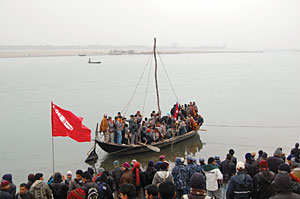Susta: A rough road track with fields on one side and a river on the other; Bhojpuri-speaking villagers, many of them Muslims; a single decrepit police post; the winter fog; and a border where you can cross into another country without even realising it - to anyone who has travelled in the Nepali Tarai, this would sound like just another of the hamlets that mark our southern plains. But Susta stands out, for in the Nepali nationalist narrative, it is seen a 'wound', and an 'attack' on territorial integrity. 
To get to Susta, you have to cross the Narayani River. It takes a ramshackle boat more than half an hour - after getting stuck in the middle - to travel across little more than 20 metres. Like in other cases of what's termed 'border encroachment', the river lies at the heart of the issue. Its shifting course has led to the fluidity of the boundary.
On the other side, three tractors are loaded up with Nepali Maoists and onlookers who have arrived to inspect 'Indian expansionism' first hand, and driven deep to the village. Some residents complain that they have land certificates, but the land itself has been 'taken away' by India. Others point out that they are surrounded by Bihar and UP on three sides, and have to go to market in India even for basic purchases - where they are harassed. They cite clashes that have occurred over the last four decades.
When asked about their demands, most residents present the following list. Give us citizenship, for more than 60
per cent of villagers are not legally Nepali. Construct a bridge so we can cross to the Nepali mainland more easily. Give us full VDC status so we don't have to travel to Triveni for every small thing. Build a health post. And demarcate the border with India.
Notice a pattern? All these demands have more to do with the utter failure of the Nepali state rather than grand Indian hegemonic designs. The lack of penetration of the state in its own territory; its diplomatic laziness and ineffectualness; its administrative failure to provide basic infrastructure; and the tendency of politicians to opportunistically whip up passions, these are at the root. India can only be blamed for its pettiness, and lack of diplomatic magnanimity. Instead of allowing such issues to fester, India would earn significant goodwill if it were willing to make certain concessions.
Residents in the deep south seem to understand this. It is an emotive issue, but the Madhes is not prosperous or strong enough to whip up nationalism geared against the Indian state. Perhaps that is why mass presence at a Maoist rally in Nawalparasi's Beltari - held right next to an India-constructed campus building - was not as strong
as expected.
But the entire campaign served a purpose. The Maoists were addressing not just border residents, but a larger national constituency, many of whom regard India with suspicion. They were also reinforcing their message about a 'remote-controlled' government in contrast to their own government, which took pro-people measures like waiving farmer loans, creating employment schemes, and increasing budgets for VDCs. Political communication is all about repeating themes innumerable times in different public settings to create mass awareness.
Crucially though, it was one more step in strengthening the organisation, energising the party cadre, and sending the message that the leadership remained committed and united.
Being embedded with the Maoists illuminated the working culture and commitment of the whole-timers that sustains the party. A large group of Maoist-affiliated students from TU came to Susta, cheerfully chanting slogans. YCL from adjacent districts were present in full force. Regional state committees were activated. Party members and sympathisers provided shelter and food. Mass meetings were organised, where martyrs were honoured, local leaders got a platform, and the Maoist position on the national political situation was explained. Other contingents replicated the pattern in different parts of the country.
Whether the Maoist 'national awareness' campaign is appropriate or will succeed is debatable. But there is little doubt that it has strengthened the party machinery further on the ground, and helped the Maoists reach
out directly to multiple constituencies.



